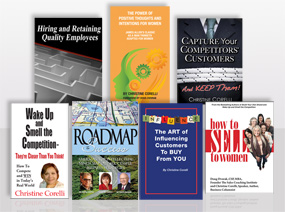
March 2001 the US economy slides into a recession, but by the time “powers that be” decided to make the announcement in 2002 it was old news! Many organizations have already taken a hard hit from the economic downturn, they have been taking measures to survive long before then. It’s 2003, and they still are. And they don’t need anyone to tell them that the economy is taking a lot longer to turn around than anticipated.
Today’s companies are facing issues and problems manifested by the economic downturn, and the downsizing, reorganization, restructuring, cost-cuts, hiring freezes and other measures they’ve taken, and have yet to take, to stay in business in a tough economy. Managerial calls to employees to embrace change have often been met with resistance and uncertainty. Low employee morale, loss of productivity is prevalent. And, although competition has always been tough, today competition is fierce. These are just some of many overwhelming challenges today’s organizations must face.
Consider a recent conversation I had with one of my clients, an equipment manufacturer, who stated, “Some people in our plant seem like they’re simply going through the motions of their jobs. They look like someone has let the air out of their tires. And our customers have become more demanding than ever. We’re waiting to see what happens with the economy in the next few months before we make any major decisions. Seems many companies are trying to figure out what to do ‘until things turn around.’ But who knows how long that will take?” Sound familiar? What to do?
Take heart! Seneca said, “It’s a rough road that leads to the heights of greatness.” Although each company has its own issues and challenges, here’s what you can do NOW to help drive business growth. You don’t have to wait “until things turn around.”
• Accept that times have changed and what has worked in the past may not work in the future. We must use change to provide the “creative tension” to keep us moving forward. Think of tough times as opportunities to tap into your creativity, get your organization running like a well-oiled machine, and seek new ways of doing business. Then, you will be able to lead your organization into a more successful future.
• Rethink your entire business strategy. Ask these questions: Have we been complacent for too long? Where might there be opportunities to expand our services? What more can we offer? How can we penetrate new markets?
• Be receptive to seeking out innovative new products that will enhance your current product line and stimulate business growth. Research and learn where new products are available that can help you to expand your business. Recognize that you may need to find products overseas that can enhance your current product, or add to your product line. You can’t afford not to. “Did you know that a number of important companies have found critical new products and technologies, especially on an initial basis, from outside companies? For example, Ray Kroc the founder of McDonald’s first ran across the whole idea and technology behind McDonald’s when traveling through Southern California and San Bernardino in the early 1950s. He established a strategic alliance with the McDonald Brothers and eventually bought out the rights to McDonald’s. This led to the multi-billion dollar corporation that exists today.
Another very interesting example is Microsoft. Although Bill Gates sometimes downplays the importance of strategic alliances and finding outside new products, the initial technology for the PC operating system that he developed for IBM originally came from a small company in Seattle called Seattle Computing. Like Ray Kroc, he initially licensed the software program and then bought out the complete rights to the software that was used for IBM type PCs. This was one of the most critical acquisitions of outside technology by a company in the computer software industry.
Think about it. Drug companies routinely license-in new pharmaceutical products or buy other companies in order to get their hands on blockbuster products. For example, Pfizer acquired Warner-Lambert so that they could get the rights to Lipitor, now one of the best selling drugs in the world now for reducing cholesterol. If your company does not pay attention to new trends, new technology developments and what is going on outside your company in terms of emerging products and markets, then you may be blind sided just like many US companies have been in the past.
Think about one of America’s foremost telecommunications companies, which in the late 1980s had an insular, if not arrogant, mentality preferring not to devote much attention to overseas competitors and outside new technologies. Before they knew it, they ran into heavy competition from Nokia in Finland, a company they initially dismissed as an obscure, foreign competitor coming from a small market in Scandinavia.
Therefore, if you are not receptive and open, and even, in certain cases, paranoid with respect to outside new technology and overseas markets, you may quickly find yourself acting in a defensive position simply to survive. Andy Grove, founder of Intel, always said it is better to be paranoid about competitors, both domestic and foreign, than to have one sneak up on you when you least expect it. All companies need to keep their eyes open, look overseas and be pro-active.”
• Differentiate or Die! If what you sell or offer is essentially the same as the competitors, you need to be different and better in your level of service and your approach to marketing and sales. Be willing to take a risk. Tap into your creativity and think about what YOU can do to differentiate your company from your competitors, so that you will truly stand out in the minds of your customers.
What new approach to sales and marketing can you take that is more bold than your competition? Be bolder, better, and sharper so you will stand out in the minds of potential and existing customers.
• Invest in technology that reduces your operational cost, improves quality, and increases your touch with the customer. Pay attention to CRM regardless of the size of your company. Use technology as the driver and the tool for business growth. Remember, there are new technologies being created every day. Obtain assistance from service-providers who can research and determine what technologies will best serve your needs.
• Make an economic downturn a good time to reexamine your business fundamentals. Think about your values and make sure your people live and breathe them every day. Go back to basics and work harder than ever to sustain and develop strong business relationships. Remember: Businesses don’t do business. People do.
• Communicate effectively. Talk with your customers, employees, suppliers and shareholders. Ask questions that will lead to answers to uncover problems and provide you with fresh ideas. Leverage vendor expertise and enlist their help in growing your own business.
• If you sell through dealer networks or distributors, ask them where they see their business in the future. Identify how you can assist them to sell more of your products. Ask what more you can do to help position them to get where they want to be in their own businesses. Then, give them the help they need. In the long run, this will pay off tenfold. Remember: Quality relationships breed long-term profitability.
• Involve your employees and enlist their support. Ask them for their extra effort and to show initiative beyond their job description. If rewards are in the picture, you will increase your chances of accomplishing this.
• Create what a Sales/Service Excellence-Accountability Culture® where everyone recognizes that they, too, are “in sales” no matter what their job role. Make sure they know that they play a strong role in developing the reputation of the company and establishing customer loyalty. Ask them to be accountable for their performance, not only to management and customers, but also to EACH OTHER. It has been said, “an organization is only as good as it’s people.” If this is true, you won’t survive unless you have the commitment from everyone in your company to display behaviors that breed customer loyalty and to deliver their best performance every day through good times and bad. What to do with those who don’t respond?
• Get rid of “dead-weight.” Those who do not “buy-in” to this culture can pull everyone down and drain your energy. Successful companies know they always need new blood. And, there are far too many unemployed quality workers out there who would love to have their job and would be willing to work harder than anyone just to have it. Currently, there are 8.3 million Americans out of work.
• This can be an opportunity to make excellent sales people out of ordinary sales people. Brainstorm with your sales staff. Analyze your “Best Sales Practices” and share the information with your entire sales force. If you sell through dealers, or your sales force is situated across the country, do it through e-mail, or hire someone to do it for you. Do it now; don’t wait for your annual sales meeting. Urge them to redouble their efforts and do what has worked in the past to increase their sales, and everything they didn’t have the time to do when times were good.
• Optimize your human capital. Train people in various positions who are outgoing and possess excellent communication skills to assist your sales force and work the phones, even for a short period of time each day. Instruct them to contact every person who might be a prospect or lead them to one. Again, if rewards are in the picture you will see a higher level of enthusiasm. When things do turn around you will have a competitive edge, as your people will have a better understanding of what your sales force must go through in their everyday sales role. They will be more supportive, and understand the “big-picture” to a greater degree.
• No matter how often you’ve heard about the importance of customer service, it always warrants reinforcement. If you want to obtain customer loyalty and remain competitive your level of service must far surpass your competition. Train everyone on customer service skills. Discuss ways you have exceeded customer expectations in the past and what you can do in the future. Make sure your customer is made to feel important–very important, and very appreciated. What have you done lately to show your customers you appreciate them?
• Make sure your infrastructure is efficient and your operations run like a well-oiled machine. Spend your time and energy in the following areas: creating, strategizing, improving operations, forming alliances, selecting the RIGHT technology, customer care, tapping into new markets, outdistancing your competitors with innovate new products and making decisions. THESE actions will help drive business growth through a tough economy–not waiting “until things turn around.”
• Don’t lose your enthusiasm. If you do others will too. Believe in yourself, your company, its products or services, and its people. Then, make the customer feel that same enthusiasm and belief.
• Stay focused on a better future. Here’s an acronym you may wish to use in your company…
Forward Thinking
Optimistic Attitude (Remember, every economic slowdown causes the markets to shift to a new direction.)
Customer-Dedicated
Urgency to Execute Solutions to Problems
Success as a Team
• Last, each and every day, do more than your best. You need to have an obsession for turning out your best performance with every customer, every employee, and every coworker every day.
Charles Darwin taught us about “Survival of the Fittest,” where those who are the most responsive to change will survive. In today’s world, those who are most adaptable will survive. Those who institute smart strategies, introduce new products and differentiate themselves from their competitors by portraying a higher level of service in every aspect of the customer experience will not only survive, but also gain a competitive edge “until things turn around.”
Photo Courtesy of (Chris Potter StockMonkeys.com) – Flickr

